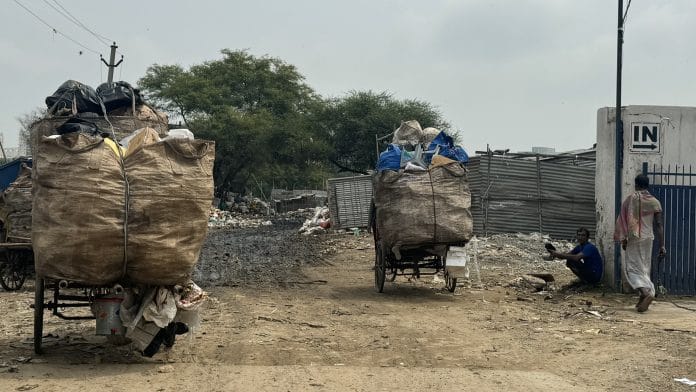Gurugram: India’s millennium city Gurugram can’t get its trash together. Rich people’s waste is now caught in a mafia-like drama involving local goondas, extortion calls, threats, and even gunshots.
Three years ago, Arun Singh received a call that turned his garbage collection business into a dangerous, high-stakes game. The caller, claiming to be a henchman of the notorious gangster Sube Gujjar, demanded Rs 2 lakh to ‘allow’ Singh’s trucks to enter DLF Cyber City for waste collection.
“If you want to work in the garbage collection business in Gurugram, you have to pay these local goons every month or be ready for your vehicles to be seized, entry to be banned, or worse, to receive death threats,” says Singh, who claims to have received half-a-dozen death threats since 2021.
Gurugram’s waste management is in a deep mess. Its stench reached Parliament last week, with Sirsa Congress MP Kumari Selja describing Gurugram and Faridabad as “overgrown urban slums”.
Arun Singh is not even a private vendor directly engaged by high-rises in the city. His company is empanelled by the Municipal Corporation of Gurugram (MCG) to collect waste from the posh DLF Cyber City, which houses commercial bulk waste generators (BWGs)—any unit (commercial or residential) that produces 50 kg or more of waste daily.
If you want to work in the garbage collection business in Gurugram, you have to pay these local goons every month or be ready for your vehicles to be seized, entry to be banned, or worse, to receive death threats
— Arun Singh, private vendor engaged in garbage collection
The attempt to prevent vendors like Singh from accessing the waste of upscale societies results from a dangerous competition between private vendors, MCG-empanelled companies, and the main contractor assigned by the civic body to collect and dispose of waste.
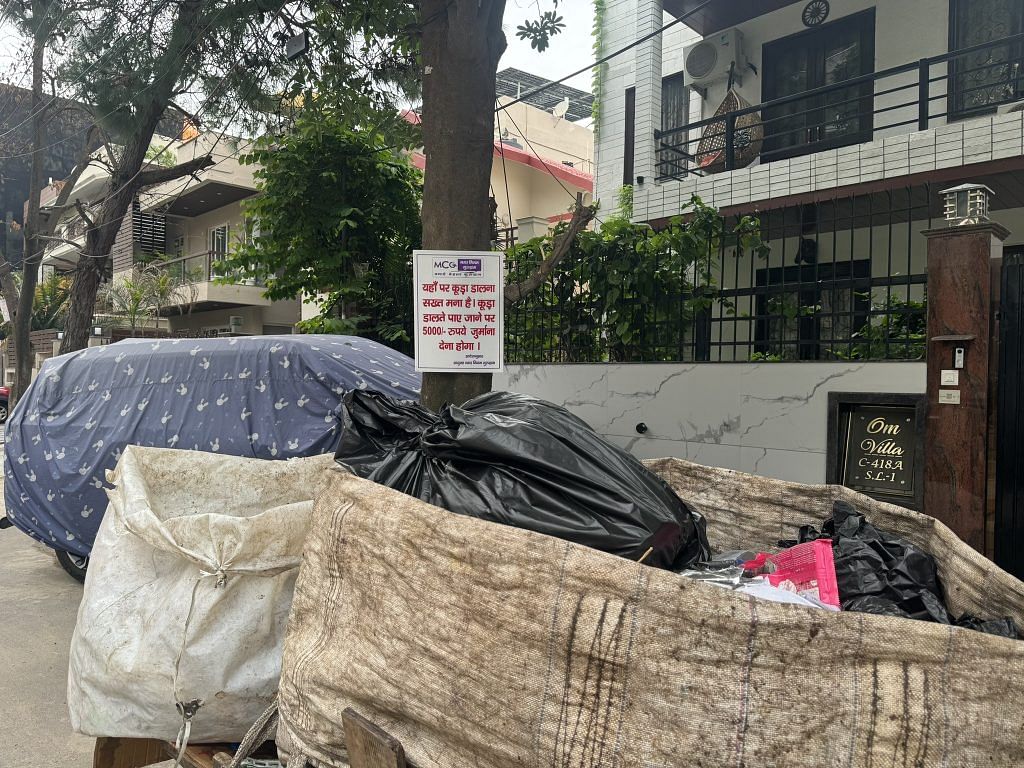
The wealthy NCR suburb hides a dirty secret behind its gleaming, over-the-top condominiums and glass-fronted IT parks. Its massive garbage empire has been hijacked by local private players and mafias, turning the city of C-suites and multinationals into one big dump yard—leaving unsegregated waste on open land parcels scattered across the city. They have only filled the void created by the collapse of a deal between a major waste manager and the local civic body.
Now, a new waste manager is in town, but the script remains unchanged. Suit-wearing entrepreneurs who specialise in recycling are scared because the mafia instructs them to stay within their limits. Gurugram’s waste is waiting to be processed while the Gurugram Municipal Corporation and EcoGreen—the company previously contracted to manage the city’s waste—engage in a blame game. The MCG claims it’s cracking down on illegal dumpers.
It’s a classic train wreck brought on by an ill-planned, over-ambitious suburb, a burgeoning population, rivalries among private companies, clueless officials, and underground, fly-by-night unaccountable garbage collection agents.
“EcoGreen created a mess in the city, and that’s why the contract was terminated. It’s been a month and a half since then, and MCG has already hired another company, Bimal Raj, for door-to-door waste collection. We are also coming up with a waste-to-charcoal plant. Gurugram produces around 1200-1500 MT of waste every day, and we are taking strict actions against anyone seen dumping waste in the open,” says GMC commissioner Narhari Singh Bhangar.
Bhangar also referred to the de-empanelment of two waste-collecting firms on 28 July for violating garbage collection procedures and dumping waste in the open.
It’s a classic train wreck brought on by an ill-planned, over-ambitious suburb, a burgeoning population, rivalries among private companies, clueless officials, and underground, fly-by-night unaccountable garbage collection agents.
A contract gone wrong
In August 2017, MCG entered into a contract with EcoGreen Energy. The company was tasked with handling citywide waste collection and recycling 80 per cent of the waste into energy. However, no waste-to-energy plant was established. Instead, EcoGreen sublet its operations to local contractors, leading to a monopoly and widespread mismanagement. These local contractors collected waste at their own discretion.
As garbage remained uncollected, residents turned to private contractors. These private players spread chaos by dumping waste in the open, under the guise of creating secondary collection points rather than transporting it to the Bhandwari landfill.
No new vendor, not even MCG-empanelled companies, were allowed to enter the areas covered by EcoGreen. This created a space for local goons to infiltrate the market.
The situation became so dire that the Haryana government had to declare a solid waste exigency in June for the urgent cleanup of Gurugram.
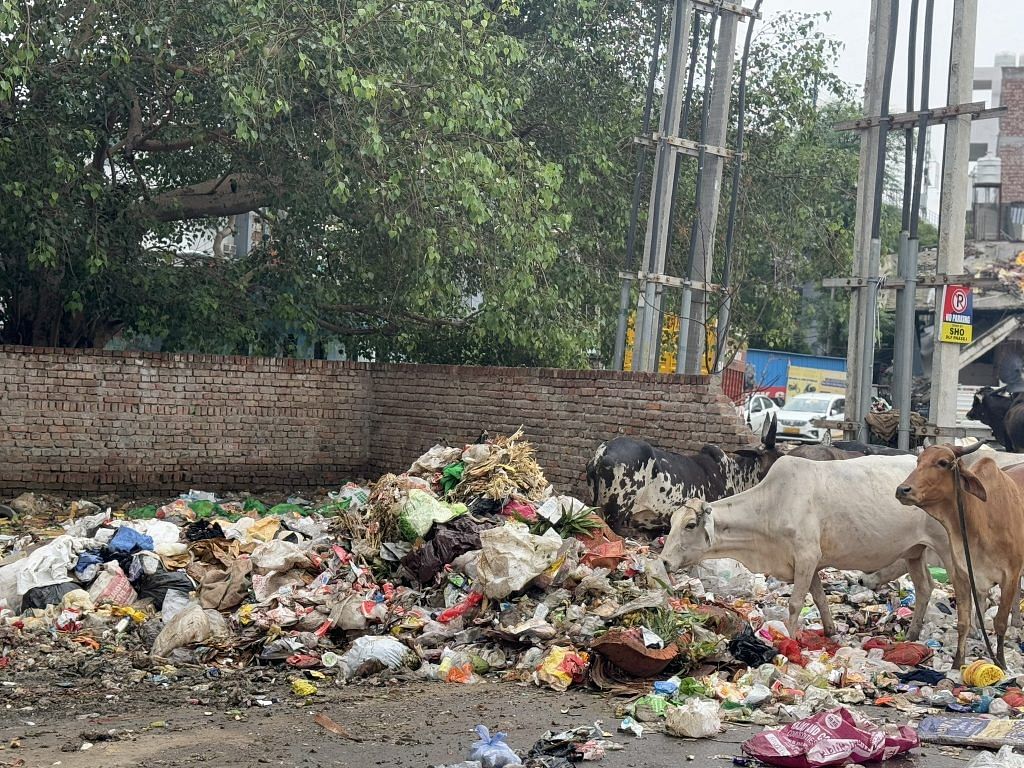
Gurugram MP Rao Inderjit Singh also intervened, writing a letter to Chief Minister Nayab Singh Saini seeking a probe into why EcoGreen’s contract was extended “despite complaints about its performance.”
However, the problem persists. The new agency, Bimal Raj, lacks resources, has sublet its work to local contractors, and open dumping of waste continues.
EcoGreen says it was wronged by the municipal body.
“We are qualified professionals. What has been done to us is absolutely unethical. We have all the proof,” said a senior official at EcoGreen on condition of anonymity.
The value of recycled monthly waste collected from DLF Cyber City alone stands at Rs 25 lakh. Cyber City generates 500 tonnes of waste every month, including heaps of cardboard, PET bottles, plastic, and other dry waste, which are valuable from a recycling perspective
— Ravi Trivedi, engaged in garbage collection business since 2012
The 2017 contract with EcoGreen was for the waste-to-energy programme, for which the MCG had agreed to allocate land.
“They didn’t give us the land and asked us to keep dumping the waste at Bhandwari,” the company official claimed. “We need at least 24 months to construct the plant on clean land. MCG has terminated us to hide their own mistakes.”
On allegations of subletting work to local players, the official claimed that local waste mafias were already operating in Gurugram before EcoGreen entered the market.
“It was not our job to stop them; it was the responsibility of the Gurugram administration. We repeatedly wrote to the administration, asking them to take action, but they didn’t.”
Battle for garbage
Garbage is gold, but only when it’s mismanaged, as is the case in Gurugram.
Ravi Trivedi, who has been in the garbage collection business since 2012 and worked with EcoGreen in 2018 and 2019, has seen this firsthand.
Trivedi’s company Triotap Technologies Ltd was assigned the task of collecting waste from DLF Cyber City. In those two years, he claims that everyone, from local goons to fellow private waste collectors, was desperate to replace him from the affluent neighbourhood because of the high value of the waste—pizza boxes, gift bags, jewellery boxes, expensive torn toys, and clothes—all of which have high prices in the waste market.
“The value of recycled monthly waste collected from DLF Cyber City alone stands at Rs 25 lakh. Cyber City generates 500 tonnes of waste every month, including heaps of cardboard, PET bottles, plastic, and other dry waste, which are valuable from a recycling perspective. All of this is recycled and sold off,” says Trivedi.
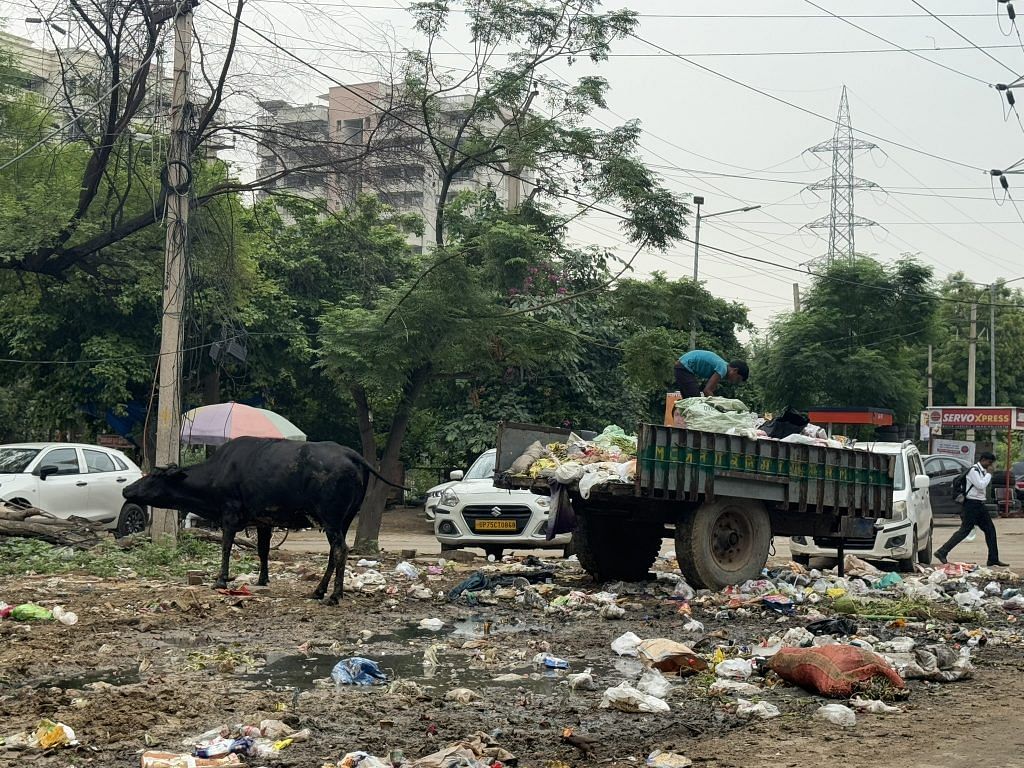
In 2010, while working as an assistant manager at an MNC, Trivedi had his first encounter with the garbage business when his waste collector, a Bengali immigrant, asked for help securing garbage contracts from big restaurants.
“I approached an eatery through a friend. The manager agreed to give the garbage to the waste collector for Rs 4,000. To my surprise, the waste collector agreed to pay. I was shocked, wondering how he had that much money,” Trivedi said.
Soon afterwards, Trivedi left his job and founded Greenwood Recyclers in 2013 but had to shut it down in 2016 due to losses.
“There were many Jats and Gurjars managing the work, and they would look down on me because I am from Bihar,” he said.
But Trivedi stayed hopeful. Then in 2017, when EcoGreen entered the scene, he was concerned the company would disrupt his small business. He approached the CEO and joined its management team in a senior position.
Gurugram’s garbage operation is a mess of broken rules, unfulfilled commitments, and mafia-style threats, reflecting an assertive jurisdictional influence—’outsiders’ are not welcome and ‘insiders’ are the real kings of this trade.
In 2019, Trivedi severed his ties with EcoGreen because the company wouldn’t allow him to recycle waste at his material recovery facility (MRF) in Khandsa, insisting dumping be done at the Bhandwari landfill. The landfill is already under scrutiny by the National Green Tribunal (NGT), which has ordered the MCG to clear the 12.3 lakh MT of waste, which the Haryana government has promised to do by 31 December.
Trivedi says EcoGreen couldn’t tolerate him recycling waste, making profits, and keeping the environment clean. He alleges that after he started working independently, his six waste collection vehicles were seized and his car was fired at twice, leading him to hire an armed bodyguard.
The EcoGreen official quoted above defended the company’s decision not to allow MCG-empanelled companies to work with bulk waste generators (BWGs).
“Why would we let them work when the contract to handle Gurugram’s waste was signed with us?”
Gurugram’s garbage operation is a mess of broken rules, unfulfilled commitments, and mafia-style threats, reflecting an assertive jurisdictional influence—’outsiders’ like Trivedi are not welcome, and ‘insiders’ like local vendors are the real kings of this trade.
Trivedi alleges similar experience working as an advisor with Bimal Raj, which also engaged local players. Eventually, Trivedi left Gurguram and moved to Himachal Pradesh, where he works with the municipal corporations handling garbage of Panchkula and Palampur.
Another independent garbage collector, who owns an MRF facility in Badshahpur on a one-acre land given by the MCG, claims he was kidnapped in 2022 by the henchmen of gangster Harbir Pradhan, who wanted him to quit the business.
“They told me, ‘You wear specs and look educated, why do you want to get into this murky waste business? Leave it for us’. I was shaken, but got out of there promising to pay a commission every month,” says the garbage collector, requesting anonymity. The area of his operation, Gurugram’s Zone 3, is considered lucrative because of Cyber City and other DLF condominiums, including Magnolias and Camellias.
Gurugram’s economy is driven by suit-wearing corporate professionals who sit in high offices and crunch crazy numbers, or write codes for foreign companies. That’s accepted. It doesn’t trouble anyone. But when they get into the dirty business, things get dirty for them.
They told me, ‘You wear specs and look educated, why do you want to get into this murky waste business? Leave it for us’. I was shaken, but got out of there promising to pay a commission every month
— an independent garbage collector who was kidnapped in 2022
Noida ahead in NCR
In the National Capital Region (NCR), Noida stands out for its effective waste management, implementing a decentralised solid waste management system. However, waste collecting agencies have been found dumping waste in the Hindon river. In July, the NGT sought reports from the chief secretary on waste generators or collection vehicles dumping solid waste along the river.
“We have a decentralised waste management system and are planning to open up more plants. Regarding waste being dumped near the river, we are looking into it,” said a senior Noida Authority official.
Faridabad faces similar waste management issues as Gurugram. EcoGreen, contracted for waste management in both cities, faced backlash from Faridabad residents who turned to private contractors due to irregular collections. Faridabad’s waste is also dumped at Bhandwari, prompting environmentalists to propose decentralised waste management systems for both cities.
Despite these challenges, Noida’s decentralised approach offers a refreshing contrast to its neighbouring cities’ struggles.
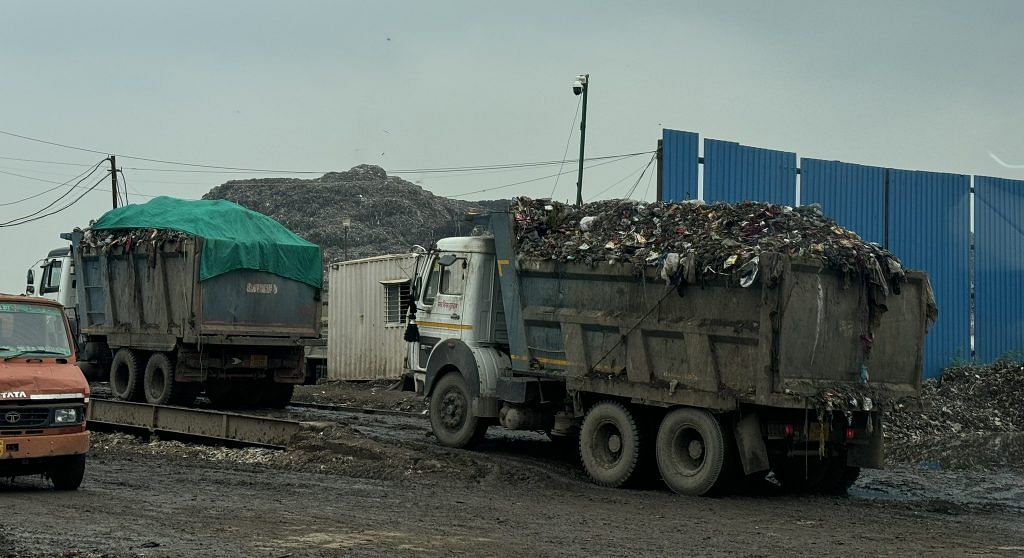
The open dumping
In June, Chatali Mandotra, an Ardee City resident, complained to the MCG helpline about four large dump yards near her house. Despite daily waste collection, garbage is dumped at these sites merely 500 meters away.
The dump yards, with scattered waste and roaming cows, have become a nightmare for residents. Mandotra’s complaint resulted in a JCB creating a landfill nearby instead of proper waste removal. When she contacted the area’s sanitary inspector, the response wasn’t encouraging.
“The sanitary inspector dismissed it, saying, ‘Madam, thoda hi kooda toh hai, chhodiye na’ (it’s just a small amount of garbage, let it be),” Mandotra said, adding she escalated the issue to senior officials, resulting in penalties, but the problem persists.
Mandotra has been uploading daily geo-tagged photos of the dump sites to the helpline’s WhatsApp number, receiving only acknowledgment calls. She met with Joint Commissioner, Zone 3 (MCG) Suman Bhankha, who provided only assurances.
When ThePrint reached out to Bhanka over the phone, it received a one-line response from the official: “We are addressing the garbage problems at Ardee City’s open dump sites.”
On 27 June, Mandotra and other RWA representatives attended a grievance meeting with CM Nayab Saini, who promised to clear all open dumping sites within a week.
“It’s been a month since then, and nothing concrete has happened,” says Mandotra, who is also a co-convener of United Gurugram RWAs, which represents over 300 associations.
The cost of transportation is only Rs 360, with the remaining Rs 640 being profit made by EcoGreen, shared among officials, agencies, and contractors, said a senior MCG official “Gurgaon generates around 1,500 tonnes of waste a day—a profit of Rs 9.6 lakh. That’s why the MCG doesn’t want to decentralise waste because this framework of corruption would break.”
Gurugram’s path may result in its slide in the Narendra Modi government’s flagship Swachh Bharat rankings. Behind the loud resolve of ‘swachh Bharat ka irada’ lie shoddy ground work. Despite residents’ efforts to segregate waste, collectors mix it in their cart, hindering recycling and proper disposal.
“I see them keeping the dry and wet waste together and dumping it at a ‘secondary collection point’. What is the purpose of us segregating?” Mandotra said.
Vaishali Rana, a green activist, and her colleague Vivek Kamboj filed a PIL in 2019 opposing waste dumping at Bhandwari landfill in Aravalis, prompting the NGT to ask the Haryana government about a definitive timeline for cleanup.
Rana, the only non-government member of the Solid Waste Environment Exigency Programme (SWEEP) committee, formed after the waste exigency declaration in June, advocates for local processing units.
“This committee came after the Bhandwari landfill reported over a dozen fires. The mixed waste going into the landfill causes high methane generation, and that is because waste is not being segregated, which is a gross violation of Solid Waste Management 2016 Rules,” Rana said.
She proposes setting up decentralised waste processing units in each of Gurugram’s 23 wards to stop waste from going to Bhandwari and end open dumping. However, progress has been slow, with authorities focusing on shifting waste to Nuh instead.
“They write these suggestions in the meeting, but nothing has started. It’s been a month. All they are concerned about is shifting waste to Nuh because they have acquired 20 acres there, but that will start the same problem,” said Rana.
The Solid Waste Management 2016 Rules require municipal corporations to establish collection systems for segregated waste streams. Gurugram doesn’t have these systems, relying instead on open dumping at secondary collection points designated by MCG, such as the one in Chakkarpur 500 metres from Cyber City.
The ‘corruption’ network
At 7 am in Sushant Lok, 55-year-old Asidul and his son collect waste door-to-door. Their cycle cart carries two white bags: one for valuables like cardboard, PET bottles, and plastic, and another for mixed waste.
“We will sell these and give 30 per cent of the money to our contractor,” said Asidul, a Bengali immigrant, who has been doing this for ten years.
Asidul is just one of the parties involved in the collection work—but none with the responsibility of processing the waste. Asidul works for Abul, who sits in a Wazirabad godown 4 km away and contracts with Rapesh Dayma. Dayma, in turn, works for Bimal Raj, a company contracted by MCG.
“My workers collect the user fee every month from households, and I give 40 per cent to Rapesh; the rest is my earnings,” says Abul.
Dayma has the contract for Sector 56, Sushant Lok. He was an independent waste collector before he started working for Bimal Raj.
“They gave me good money. Waste is profitable in Gurgaon. Zone 3 is the most lucrative one,” said Dayma, a Class 10 dropout.
MCG claims to have 24 secondary collection points where waste is dumped before transportation to Bhandwari landfill. Until two months ago, the tipping fee—the cost of transporting, loading, and unloading from collection points to the landfill—was Rs 1,000 per tonne of waste.
The cost of transportation is only Rs 360, with the remaining Rs 640 being profit made by EcoGreen, shared among officials, agencies, and contractors, said a senior MCG official.
“Gurgaon generates around 1,500 tonnes of waste a day—a profit of Rs 9.6 lakh. That’s why the MCG doesn’t want to decentralise waste because this framework of corruption would break,” added the official.
Since Bhangar’s appointment as commissioner in January, the tipping fee has reduced to Rs 390, but corruption continues through inflated weight reporting, says another waste collector empanelled by MCG.
Mandotra claims that lack of waste segregation benefits collectors as mixed waste is heavier.
Bimal Raj, contracted by MCG for only a year, is not investing in vehicles and other resources for waste collection. Barely six weeks into the job, it is already facing allegations of extortion.
Gaurav Takk, president of Akhil Bhartiya Safai Karamchari Kalyan Sangh (ABSKKS), said Bimal Raj uses vehicles of rag pickers and extorts money from them or terminates services.
“Rag pickers are being asked to give Rs 5,000-10,000 every month,” said Takk.
ThePrint contacted Bimal Raj via calls, messages and mails but received no response.
Residents complain of irregular collection and violence from local collectors. Sunny Singh Daultabad from Palam Vihar reports issues with collector Naveen Yadav, including physical attacks on residents.
“His goons broke one of the residents’ hands. We filed a police complaint, he was arrested but later released on bail.”
Commissioner Bhangar denies these allegations, saying everything is under control.
“We have been working on waste segregation, but until there is a proper mechanism at Bhandwari, it is not possible. Now, we are searching for a new place for dumping and also considering the decentralisation model,” he said.
But the commissioner’s words don’t convince Abul, who has worked long enough to know that “everyone wants money”.
“I have been beaten up several times, both under EcoGreen and Bimal Raj, because other parties want the waste from Sushant Lok. No one can sort this Gurgaon mess. It is deep and murky,” he said.
He is held back by his limitations in Gurugram.
“Had these goons been in my Bengal, I would have shown them, but I am a poor man and I need money. This way or that way, I need to run my family.”
(Edited by Prashant)



